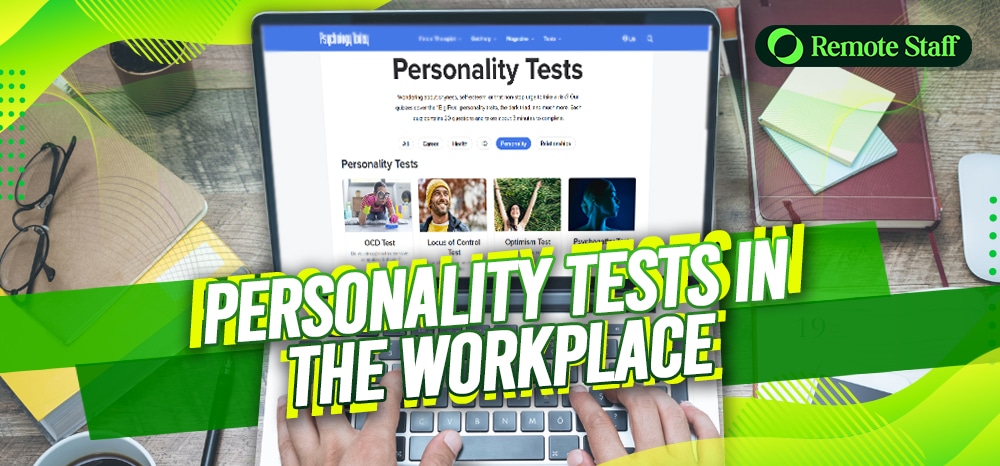As companies strive to create dynamic, productive, and innovative environments, they are increasingly turning to personality tests as a tool to enhance team dynamics, improve hiring decisions, and foster employee growth. Personality tests have become a staple in many organisations, but their effectiveness is often debated.
Some argue that these assessments provide invaluable insights into an individual’s behavioural traits, helping employers identify the right candidates and develop tailored development programs. Others contend that personality tests are too simplistic, failing to capture the full complexity of human behaviour and potentially leading to biased hiring decisions.
However, the effectiveness of personality tests also depends on several factors, including their scientific validity, administration, and interpretation. For instance, some tests, like the Myers-Briggs Type Indicator (MBTI), got criticised for lacking empirical support, while others, such as the Big Five Personality Traits, are widely recognised for their reliability and predictive power.
Despite these debates, the use of personality tests continues to grow. This is largely because they offer a structured approach to understanding individual differences, which can be particularly valuable in today’s diverse and globalised workforce. Therefore, it is crucial for organisations to carefully select and implement personality assessments that are grounded in robust psychological research and tailored to their specific needs.
What is a Personality Test and Why is it Important?
A personality test is a standardised method used to evaluate an individual’s behavioural traits, preferences, and tendencies. These assessments provide valuable insights into how individuals interact with others, approach challenges, and align with organisational cultures. The importance of personality tests lies in their ability to predict job performance, improve employee retention, and enhance team collaboration.
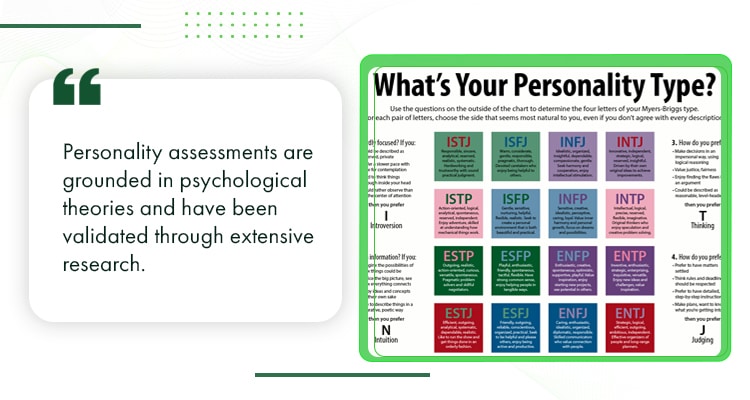
Understanding Personality Assessments
Personality assessments are grounded in psychological theories and have been validated through extensive research. They help organisations understand the strengths and weaknesses of their employees, tailoring development programs and improving communication within teams.
For instance, a study by the American Psychological Association found that employees who understand their personality traits are more likely to engage in fulfilling careers and collaborate effectively with colleagues.
Benefits of Using Personality Tests in the Workplace
The integration of personality tests into workplace dynamics offers several benefits:
- Enhanced Team Dynamics: By understanding individual personality traits, teams can work more cohesively, leading to increased innovation and productivity. This understanding helps in aligning tasks with strengths and improving communication among team members, which can resolve conflicts more effectively.
- Improved Employee Retention: Organisations that use personality assessments often see a significant reduction in turnover rates, as employees are better matched to roles that align with their strengths and preferences. This alignment supports career development and personal growth, making employees more likely to stay with the company.
- Better Hiring Decisions: Personality tests help employers identify candidates who fit the company culture and role requirements, reducing the risk of costly hiring mistakes. These assessments provide a more objective evaluation of candidates, promoting fairness and reducing unconscious bias in the hiring process.
- Streamlined Hiring Process: Personality assessments can streamline the hiring process by reducing the number of unqualified candidates who reach the interview stage. This is achieved by providing insights into a candidate’s workplace skills and typical work behaviours, ensuring that only the most suitable candidates are considered.
- Increased Employee Engagement and Productivity: By understanding employees’ motivations and strengths, managers can tailor challenges and tasks to align with these factors, leading to higher engagement and productivity. Employees feel valued when their personality traits are recognised and utilised effectively.
- Cultural Adaptability and Alignment: Personality testing helps guarantee that new hires are adaptable to the organisation’s evolving needs and align with its cultural values. This adaptability is crucial in today’s fast-changing business environment, where soft skills are increasingly important.
- Personal and Professional Growth: Personality assessments facilitate personal and professional growth by identifying areas where employees need development. This targeted approach accelerates career advancement and enhances overall job satisfaction.
- Ethical and Equitable Hiring Practices: Personality testing promotes fairness and equity in hiring by evaluating candidates based on standardised criteria, reducing reliance on subjective factors like educational background or personal biases.
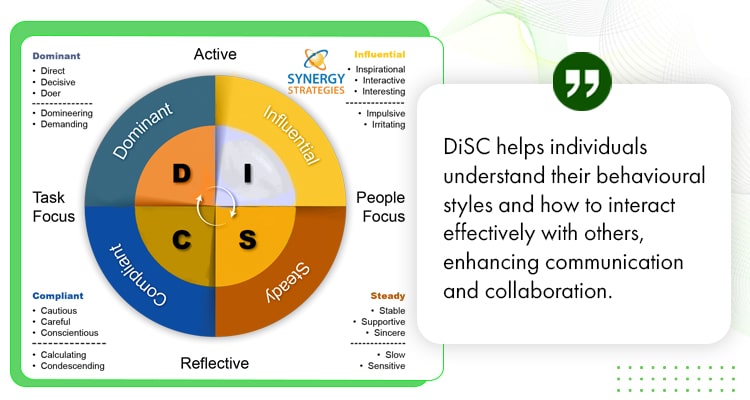
Top 10 Most Popular Personality Tests in the Workplace
There are several types of personality assessments, each with its unique approach:
1. Myers-Briggs Type Indicator (MBTI): Focuses on categorising individuals into one of 16 personality types based on preferences for introversion or extroversion, sensing or intuition, thinking or feeling, and judging or perceiving.
Best Use: Team building and communication. The MBTI helps understand individual preferences for communication and work styles, which can improve team collaboration and communication.
2. Big Five Personality Traits: Evaluates openness, conscientiousness, extraversion, agreeableness, and neuroticism, providing a comprehensive view of an individual’s personality.
Best Use: Roles requiring ethical decision-making and emotional control. It evaluates behavioural tendencies and ethical values, making it suitable for positions that demand high integrity and emotional stability.
3. DISC Assessment: Measures dominance, influence, steadiness, and conscientiousness, helping to understand communication styles and work preferences.
Best Use: Communication and teamwork. DiSC helps individuals understand their behavioural styles and how to interact effectively with others, enhancing communication and collaboration.
4. Hogan Personality Inventory: Assesses normal personality traits and potential performance risks, providing insights into leadership potential and interpersonal skills.
Best Use: Leadership development and selection. It evaluates personality traits related to job performance, leadership potential, and career derailment risks, making it valuable for identifying and developing future leaders.
5. StrengthsFinder: Focuses on identifying individual strengths rather than weaknesses, helping employees excel in roles that align with their talents.
Best Use: Team building, employee engagement, and personal development. CliftonStrengths identifies individuals’ top strengths and provides guidance on how to leverage them for success, enhancing team collaboration, productivity, and employee satisfaction by focusing on what employees do best.
6. NEO Personality Inventory (NEO PI-R): This inventory assesses individuals across five major dimensions of personality—neuroticism, extraversion, openness to experience, agreeableness, and conscientiousness—providing a comprehensive view of personality traits and their facets.
Best Use: Leadership development, team building, and candidate selection. It provides a comprehensive view of personality traits, making it ideal for understanding individual strengths and areas for development in leadership roles and team dynamics.
7. California Psychological Inventory (CPI): The CPI is a self-report inventory designed to assess everyday personality traits and behaviours, focusing on folk concepts that are cross-culturally relevant, and is commonly used in research and individual assessments.
Best Use: Organisational development, coaching, and HR applications. The CPI offers practical insights into leadership styles and how individuals manage themselves and others, making it suitable for improving performance and leadership development.
8. Thomas-Kilmann Conflict Mode Instrument (TKI): The TKI is a tool used to assess an individual’s conflict-handling modes, helping to identify how they manage and resolve conflicts in different situations, typically categorising responses into five modes: competing, collaborating, compromising, avoiding, and accommodating.
Best Use: Conflict resolution and management. The TKI helps individuals understand their conflict-handling styles, which is beneficial for improving organisational productivity and facilitating effective conflict resolution strategies.
9. Enneagram Personality Test: This test categorises individuals into one of nine distinct personality types, each with its own motivations, fears, and desires, aiming to provide insights into personal growth and self-awareness by understanding these core personality dynamics.
Best Use: Teamwork, communication, and leadership development. The Enneagram provides insights into motivations and behaviours, helping teams understand why individuals act in certain ways, which can enhance collaboration and leadership effectiveness.
10. The Predictive Index (PI): The Predictive Index is a science-backed HR software solution that uses behavioural assessments to help organisations hire, develop, and retain top talent by optimising the entire employee lifecycle, reducing hiring mistakes, and improving team performance through data-driven insights and intuitive software tools.
Best Use: Hiring, talent optimisation, and team building. The PI helps identify candidates who fit well with a role and company culture, reducing hiring mistakes and improving team dynamics by aligning employees with their intrinsic motivations and strengths.
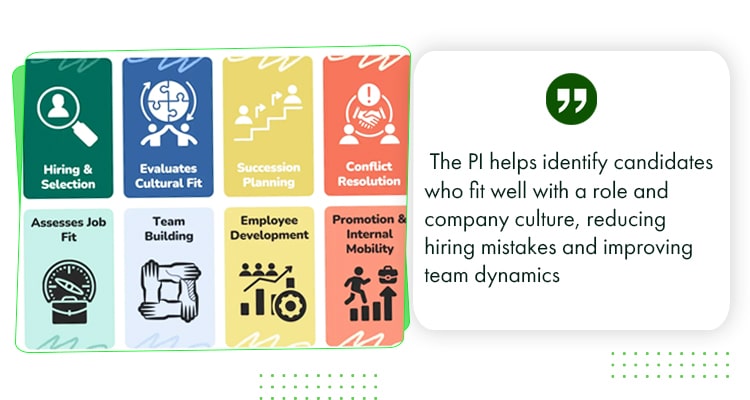
How to Choose the Best Personality Test for Your Needs
When selecting a work personality test, consider the following factors:
- Purpose: Determine whether the assessment is for hiring, employee development, or team building. Different tests are suited for different purposes. For example, the Predictive Index is excellent for hiring and talent optimisation, while CliftonStrengths is ideal for employee development and team building.
- Validity: Make sure the test is scientifically validated and reliable. Tests like the Big Five Personality Traits are widely recognised for their scientific backing and reliability.
- Ease of Use: Choose work personality assessments that are easy to administer and interpret. Consider user experience and whether the test provides clear instructions and minimal room for subjective interpretation.
- Job Relevance: Select a test that directly evaluates traits crucial for the specific role you are filling. For instance, if you need to assess interpersonal skills, the Enneagram might be more suitable.
- Contextualization: Consider whether the test is contextualised for your specific workplace needs. Contextualised tests tend to have higher validity in predicting job performance.
- Combination with Other Tools: Consider using a multi-measure approach that combines personality assessments with cognitive tests, work-sample tests, and technical-skill exercises to get a comprehensive view of candidates.
- Expertise and Validation Sample: Make sure the test is created by experts in psychometrics and validated on a sample similar to your candidate pool. This guarantees the test’s results are applicable to your specific needs.
- Cost and Administration Time: Evaluate the cost and administration time of the test to make sure it fits within your organisational constraints.
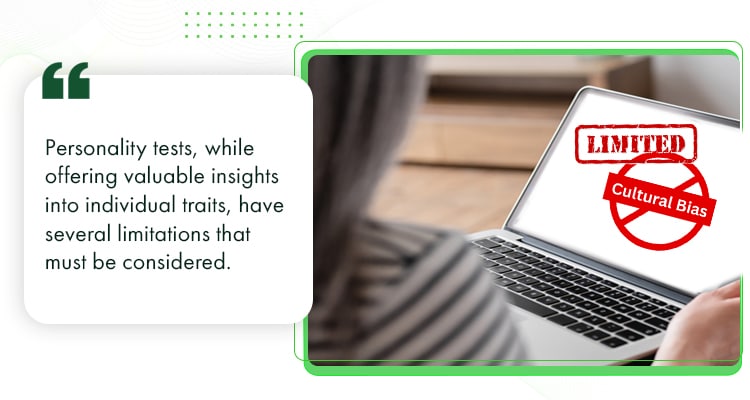
What are the Limitations of Personality Tests?
Personality tests, while offering valuable insights into individual traits, have several limitations that must be considered. One significant issue is cultural bias, where assessments may not be equally effective across different cultures.
For instance, personality tests can have reduced reliability in collectivist cultures, leading to potential misinterpretations in global workplaces. Additionally, misinterpretation of results can occur if tests are not administered or analysed correctly, which can lead to incorrect conclusions about a candidate’s suitability.
Overreliance on personality tests for hiring decisions can also overlook other crucial factors like skills and experience, as these tests only provide a partial view of an individual’s capabilities. Furthermore, there are misconceptions about personality assessments, such as the belief that they can predict future behaviour with absolute certainty or that they are infallible tools for hiring.
In reality, personality assessments should be used as part of a comprehensive hiring process. Ensuring the validity of personality test results is also critical, as it depends on the scientific rigor behind the assessment and how it is administered.
Another important consideration is that personality tests should not be used to weaponise workplace conflicts or make biased decisions about employee interactions. They should be used constructively to enhance team dynamics and understanding, rather than to justify or exacerbate conflicts.
Lastly, assessing personality across cultures poses challenges due to differences in cultural norms and values, highlighting the need for culturally sensitive and validated assessments.
How Can Organisations Implement Personality Assessments?
- Integrate Assessments into Hiring Processes: Use tests to identify cultural fit and predict job performance.
- Tailor Development Programs: Align training with individual strengths and weaknesses.
- Monitor Outcomes: Regularly evaluate the impact of personality assessments on team dynamics and employee satisfaction.
- Professionalism: Ensuring that tests are administered by trained professionals, providing clear instructions to participants, and using results to inform hiring and development decisions rather than making them the sole basis for these decisions.
As we continue to integrate personality tests into workplace dynamics, it is crucial to address a broader ethical concern—the potential for these assessments to be used as tools for social control rather than genuine team enhancement. By relying heavily on personality tests to manage employee interactions and conflicts, organisations risk creating a culture where individuality is suppressed in favour of conformity to predefined personality types.
This could lead to a homogenisation of workplace environments, stifling creativity and innovation that often arise from diverse perspectives. Instead, personality tests should be used judiciously to foster a culture of understanding and inclusivity, where differences are celebrated and leveraged to drive organisational success.
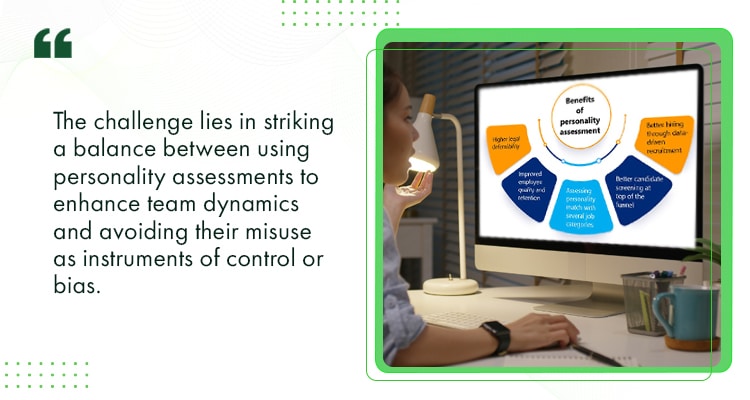
Ultimately, the challenge lies in striking a balance between using personality assessments to enhance team dynamics and avoiding their misuse as instruments of control or bias.
- Want FREE AI Prompts for Different Areas of Your Business? Check out these 100 AI prompts.
- Curious About How to SAVE and Maximize on Taxes? Learn more here.
- If you’re ready to experience the full advantages of working with a top global team, check out our 1,000 fully vetted and highly talented staff here.
Darren Aragon is a multifaceted writer with a background in Information Technology, beginning his career in research at Pen Qatar and transitioning through customer service to a significant role at Absolute Service, Inc. His journey into freelance writing in 2021 has seen him excel across various niches, showcasing his adaptability and deep understanding of audience engagement.

